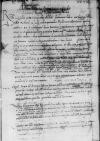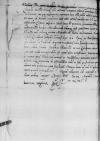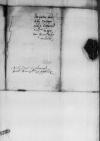Habuimus ⌊⌋ Strenuitatis
Tuae datas ex ⌊Bruxellis⌋ ⌊Brabantiae⌋ 1531-07-20⌊20 Iulii1531-07-20⌋
, nostris superioribus et plurimis responsivas, quibus scribit Strenuitas
Tua se intellexisse brevi futuram expeditionem negotii nostri ⌊Montis Serici⌋ in regno Neapolitano, qua in re scribit magnificus ⌊Ludovicus Aliphius⌋ regius ac noster orator instari instantissime, ut quantocius definiretur. Licet de contraria sententia verendum sit, quemadmodum Strenuitas
Tua scribit, gratum nobis est, quod in ea re tanta nunc adhibetur diligentia, ut illic cito explicetur, quo istic tandem ex sententia nostra absolvatur iuxta promissionem sacrae ⌊caesareae maiestatis⌋. Solum enim id negotium Strenuitatem
Tuam istic remoratur tantisper. Quod ubi absolutum ex voto nostro fuerit, idque litteris [Strenuitas
Tua] nobis declaraverit, tum illam sacra ⌊maiestas regia⌋ nosque litteris nostris revocabimus. Interim paulisper sustineat, id quoque negotium ⌊Montis Serici⌋ cordi habeat et Dohanam Trani aut Monopoli, vel summas rebellium non omittat, sicut pluries scripsimus. Caute tamen ducat, ne primum per extremum inficiatur, quod prudentiae Strenuitatis
Tuae committimus.
Quod ⌊Scipio de Summa⌋ rerum suarum hactenus nihil effecerit et Carducius privilegii sui, cui abusus obicitur, confirmationem non obtinuerit, nihil ad nos, totum in arbitrio caesaris consistit. Tua vero Strenuitas
talem se erga illos exhibeat, qualem prioribus nostris litteris monuimus.
⌊Velseri⌋ etiamnum litteris suis questi sunt nobis sescentos ducatos, per Tuam Strenuitatem
ab illis mutuo acceptos extraordinarie, illis a ⌊thesaurario nostro Barensi⌋ non esse solutos. Commisimus iam pridem ⌊illi⌋, ut omnino solveret, credimusque proculdubio in hanc diem totum solutum esse, hos videlicet sescentos.
Ceterum ex litteris ⌊Sigismundi Lofredi⌋ domino Valdesio scriptis et per Strenuitatem
Tuam suis inclusis, nobis missis, intelleximus, quomodo magnificus ⌊Ludovicus
Aliphius⌋ regius ac noster orator, quasdam litteras exsecutoriale[s] concilii sanctae Clarae illi oblatas acceptare noluerit, quin etiam illa[s] calcaverit. De quo vehementer miramur, nec ullo pacto adduci possum[us], ut eum id fecisse credamus. Scit enim optime, quales nos sese erga officiales caesaris exhibere solitae simus, et quantum humanitatis et benevolentiae illis semper ostenderimus idemque ipse potissimum sponte sua et iussu nostro ceterique omnes officiales nostri facere consueverunt. Verum ipsius quoque ⌊Ludovici Aliphii⌋ litterae, datae XX Iunii ex Baro, heri nob[is] per manus ⌊Ioannis Iacobi de Dugnano⌋ transmissae sunt. Huiusce autem rei n[e] ioco quidem scribit. Scribimus etiam ⌊illi⌋, ut nos quamprimum edoceret, quonam modo res ipsa acta sit, quod dum acceperimus, faciemus ce[rtiorem] Strenuitatem
Tuam, quae etiam nostro nomine dominum ⌊Valdesium⌋ convenire poterit e[t] referre atque hortari, ne de officialibus nostris ea sibi persuaderet, quin ... minus vere relatum certo existimet. Totum enim id nostri et ipsius [ora]toris aemuli insimulant. Quod reliquum est, cupimus Strenuitatem
Tuam bene valere.


